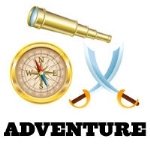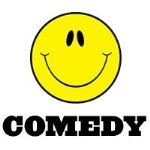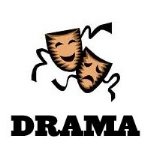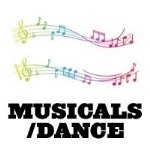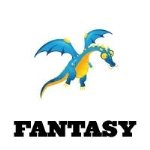Урок для 10 класу на тему "Кіно"
Тема: Кіно
Мета: : повторити та активізувати ЛО з теми
навчати монологічного висловлювання
формувати вміння активізувати увагу та мислення
розвивати вміння сприймати діалогічне мовлення на слух для отримання потрібної інформації
практикувати читання тексту з метою отримання потрібної інформації
сприяти збагаченню словникового запасу
розвивати емоції, використовуючи яскраві ілюстрації, музичний супровід тощо
виховувати інтерес до мистецтва кіно
Обладнання: роздатковий матеріал, мультимедійна презентація
Тип уроку: комбінований
Види роботи: робота з ЛО, практичні вправи, читання, аудіювання
Методична мета: активізація навчально-пізнавальної діяльності учнів шляхом розвитку та удосконалення умінь та навичок
Хід уроку
І. Орг.момент.
ІІ. Підготовка до сприйняття іншомовного мовлення.
During the previous lesson we started the new topic – “Cinema”
That`s why I propose you to start our lesson with an interesting game – “Guess the phrase from the film”
Houston, we have a problem. – Г`юстон, у нас проблема. (Apollo 13)
You can say this when you have big problems.
I'll be back. – Я повернуся. (Terminator)
It's alive! It's alive! – Воно живе! Воно живе! (Frankenstein)
Божевільний вчений сказав цю фразу, коли сутність, яку він створив, стала живою. Можете використати цю фразу, коли, наприклад, компﹸютер, який ви намагалися відремонтувати, нарешті, запрацював.
I've got a feeling we're not in Kansas anymore. – У мене таке відчуття, що ми вже не в Канзасі. (The Wizard of Oz)
You can say this when you are in an unknown place, strange place.
Bond. James Bond. - Бонд. Джеймс Бонд. (Dr. No)
There's no place like home. –В гостях добре, а дома краще. (The Wizard of Oz)
May the force be with you. –Да буде з тобою сила. (Star Wars)
.
You Shall Not Pass! –Ти не пройдеш! (The Lord of the Ring)
Коли не хочете когось пропускати.
Everything begins with choice – Все починається з вибору
Це вже з «Matrix».
As you guess today we continue to speak about cinema. During the lesson we’ll repeat and learn the new words on topic “Cinema”, practice listening, reading and speaking.
ІІІ. Основна частина уроку.
Your home task was to learn the new words and write three sentences with them, and prepare some information about one of this genres.
Look through the pictures “Different genres of films” and guess the genre of the film.
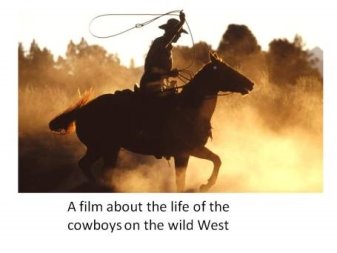
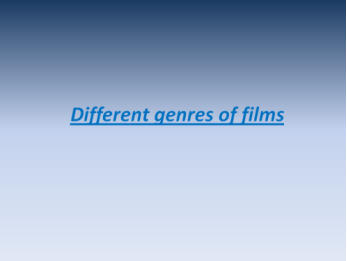
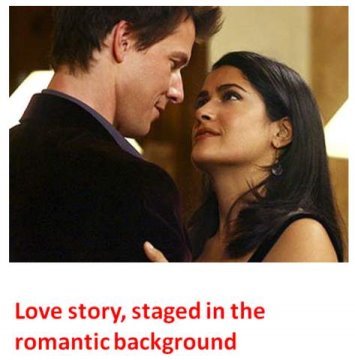
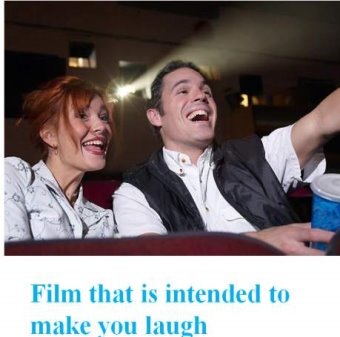
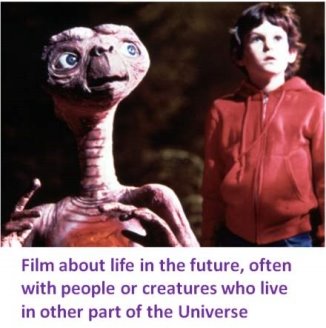
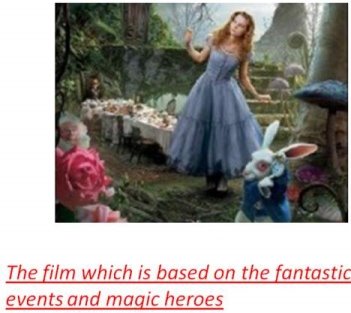
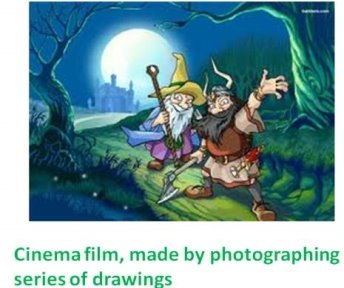
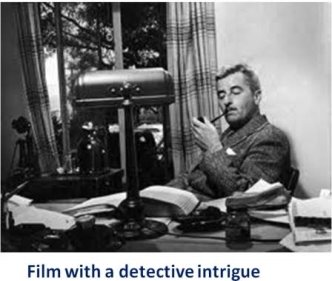
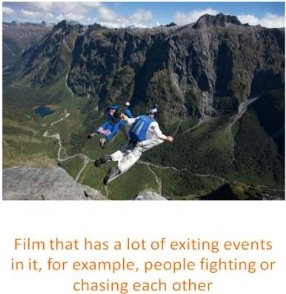
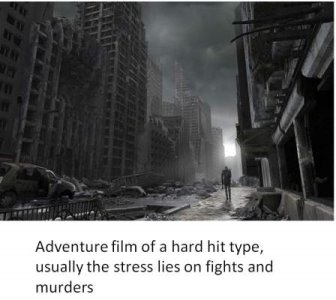
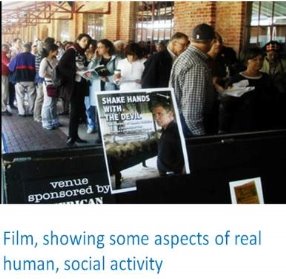
Now I propose you to do an exercise with these words.
Complete the text with the words from the box:
|
Comedies, historical films, horror films, musicals, science fiction films, westerns |
Family and I love going to cinema but we do not like the same kinds of films. Mum likes ____________because she loves stories about the future. Dad is a fan of _________. He enjoys scary stories about vampires/ my little sister likes _________ ! She says she likes stories about cowboys, but SI think she watches these films because there are usually horses in them. She loves horses. I like __________ because I like laughing, and I love _________ because the songs in them often great. I also enjoy ___________ about kings and queens.
Your home task was to prepare about any genre of films
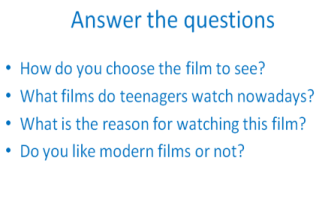

So as you see cinema is a great invention and now we have different kinds of cinemas, I propose you listen to the dialogue, while listening you should fill in the gaps.
Jack: Hi, Ismael. How are you?
Ismael: Hi, Jack. I'm OK but I’ve got loads of homework.
Jack: Me too, but would you like to come with us to the cinema tonight?
Ismael: Who's 'us'?
Jack: Me, Jamie, Nicola and Selina.
Ismael: OK, and what's the film?
Jack: We don't know. We can't decide. There's that new horror film, 'Light and Dark'.
Ismael: No, no, no! I don't like horror films.
Jack: OK, well, there's a comedy about a school.
Ismael: Oh, no more school, please! What about a romcom?
Jack: Romcom?
Ismael: You know, romantic comedy, boy meets girl ...
Jack: What? Really? No, I hate romantic films. I like action.
Ismael: Well, there's a new science fiction film, 'Alien attacks'.
Jack: OK, I like science fiction. Let's see that.
Ismael: OK, I'll ask the others if they like sci-fi.
Jack: What time is the film?
Ismael: At 8 o'clock. Let’s meet at 7:30 outside the cinema.
Jack: OK. See you later.
Ismael: Bye.
Jack: Hi, Ismael. How are you?
Ismael: Hi, Jack. I'm OK, but I’ve got loads of
![]() .
.
2.
Jack: We don’t know. We can’t decide. There’s that new
![]()
film, 'Light and Dark'.
3.
Jack: OK, well, there’s a
![]()
about a school.
4.
Ismael: Oh, no more school, please! What about a
![]()
?
5.
Jack: What? Really? No, I hate romantic films. I like
![]() .
.
6.
Ismael: Well, there’s a new science fiction film, 'Alien attacks'.
Jack: OK, I like
![]()
. Let's see that.
7.
Ismael: At 8 o'clock. Let's meet at 7:30
![]()
the cinema.
8.
Jack: OK.
![]()
you
![]()
.
Ismael: Bye.
Now you will read the text and do some tasks. Before reading look at the title and say what is this text about?
The Fame
My favourite film is Fame. I have got the DVD and I often watch it with my sister because we love musicals. My mum sometimes watches it with us but my dad never watches it because he hates musicals. He thinks they are awful. Fame is about a group of American students at the School of Performing Arts in New York. The students at school are actors and they also sing and dance. There are lots of songs. The music is great. My dad thinks they are boring, but I think the acting is marvelous. I like Fame because the characters in the film are really interesting. The main characters of the film are Denise Dupree and Victor Taveras. I like Denise. She plays a romantic character but she is also very funny. In my opinion the Fame is great because the plot and the characters are fantastic and the songs are amazing.
Answer the questions:
- What type of the film is the Fame?
- What is it about?
- Who is girl's favourite character?
- Why does she like this film?
And now I propose to say some sentences about your favourite film, these words and expressions will help you.
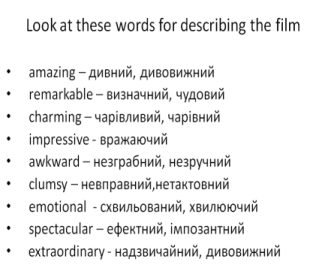
- It’s a beautiful film.
- The music is great.
- I was terribly frightened.
- The plot is very simple.
- The animation is fantastic.
- The acting is marvelous.
- The acting is awful.
- It’s a very funny scene.
- This is a terrible episode.
- I’ve never seen such a happy ending.
- What is your favourite film?
- What type of film is it?
- What is this film about?
- Who is your favourite character?
- What is your opinion of the film?
IV. Заключна частина уроку
T: Thanks a lot for your work at the lesson. I’m satisfied with you. I hope that you have taken a lot of useful and interesting information from the lesson. So it will be not difficult for you to do your hometask, which you can see on the screen.
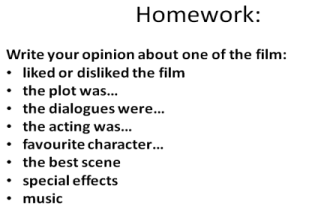
T:. Let’s summarize our today’s lesson.
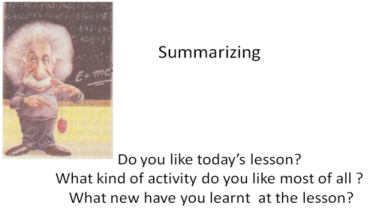
ДОДАТКИ
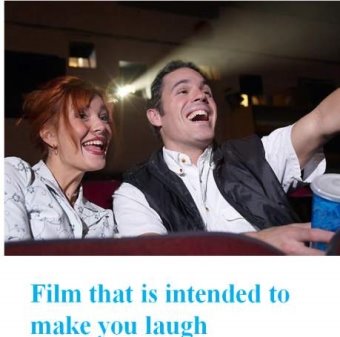
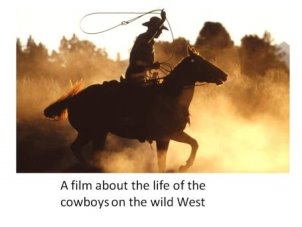
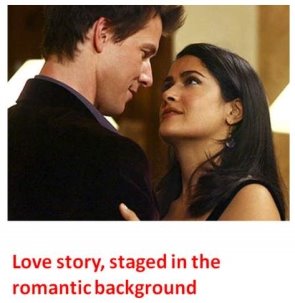
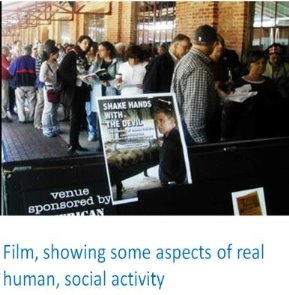
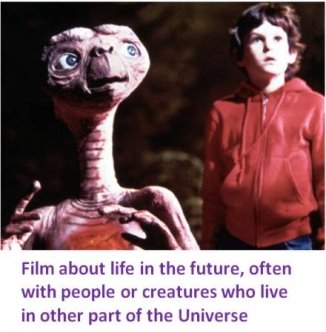

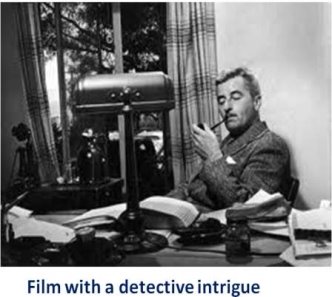
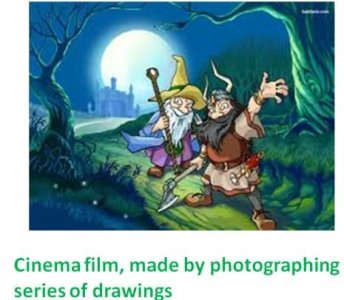
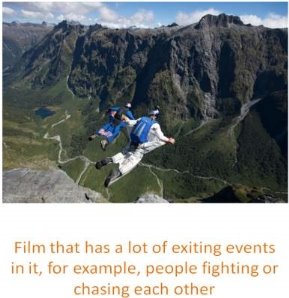

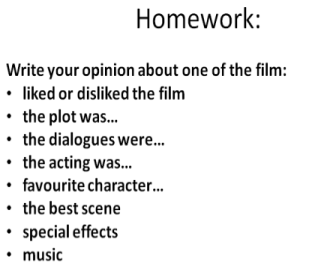

- It’s a beautiful film.
- The music is great.
- I was terribly frightened.
- The plot is very simple.
- The animation is fantastic.
- The acting is marvelous.
- The acting is awful.
- It’s a very funny scene.
- This is a terrible episode.
- I’ve never seen such a happy ending.
The Fame
My favourite film is Fame. I have got the DVD and I often watch it with my sister because we love musicals. My mum sometimes watches it with us but my dad never watches it because he hates musicals. He thinks they are awful. Fame is about a group of American students at the School of Performing Arts in New York. The students at school are actors and they also sing and dance. There are lots of songs. The music is great. My dad thinks they are boring, but I think the acting is marvelous. I like Fame because the characters in the film are really interesting. The main characters of the film are Denise Dupree and Victor Taveras. I like Denise. She plays a romantic character but she is also very funny. In my opinion the Fame is great because the plot and the characters are fantastic and the songs are amazing.
Answer the questions:
- What type of the film is the Fame?
- What is it about?
- Who is girl's favourite character?
- Why does she like this film?
Jack: Hi, Ismael. How are you?
Ismael: Hi, Jack. I'm OK, but I’ve got loads of
![]() .
.
2.
Jack: We don’t know. We can’t decide. There’s that new
![]()
film, 'Light and Dark'.
3.
Jack: OK, well, there’s a
![]()
about a school.
4.
Ismael: Oh, no more school, please! What about a
![]()
?
5.
Jack: What? Really? No, I hate romantic films. I like
![]() .
.
6.
Ismael: Well, there’s a new science fiction film, 'Alien attacks'.
Jack: OK, I like
![]()
. Let's see that.
7.
Ismael: At 8 o'clock. Let's meet at 7:30
![]()
the cinema.
8.
Jack: OK.
![]()
you
![]()
.
Ismael: Bye.
Complete the text with the words from the box:
|
Comedies, historical films, horror films, musicals, science fiction films, westerns |
Family and I love going to cinema but we do not like the same kinds of films. Mum likes ____________because she loves stories about the future. Dad is a fan of _________. He enjoys scary stories about vampires/ my little sister likes _________ ! She says she likes stories about cowboys, but SI think she watches these films because there are usually horses in them. She loves horses. I like __________ because I like laughing, and I love _________ because the songs in them often great. I also enjoy ___________ about kings and queens.
Cartoons and animated movies is the branch of movies for children, which have very bright images, colors and music. Originally they used to be drawn by artists, however, almost all modern cartoons are created with the help of computer animation.
Cartoons help children to understand the world around them and they also form the basis of their personality. In the past children used to read a lot, but nowadays cartoons became children’s guideline.
I think that modern cartoons are becoming more and more over-aged. The industry creates products for both children and their parents. One of the biggest problems is that cartoons nowadays become meaningless, their only purpose is entertainment. For example, I think such a popular cartoon as SpongeBob SquarePants shouldn’t be on air at all, because it can influence children mental health in a bad way. The characters of some cartoon series make me think about the existence of possible mental problems of their creators. There’s also violence and even a hint of sex in modern cartoons.
In spite of all new technologies, it seems that all animation masterpieces were created dozens of years ago. And what we see now is a weak attempt to create something at least as good as it used to be
Adventure Films are exciting stories, with new experiences or exotic locales. Adventure films are very similar to the action filmgenre, in that they are designed to provide an action-filled, energetic experience for the film viewer. Rather than the predominant emphasis on violence and fighting that is found in action films, however, the viewer of adventure films can live vicariously through the travels, conquests, explorations, creation of empires, struggles and situations that confront the main characters, actual historical figures or protagonists.
Adventure films were intended to appeal mainly to men, creating major male heroic stars through the years. These courageous, patriotic, or altruistic heroes often fought for their beliefs, struggled for freedom, or overcame injustice. Modern adventure films, some of which have been successful blockbusters, have crossed over and added resourceful action heroes (and oftentimes heroines).
Under the category of adventure films, we can include traditional swashbucklers, serialized films, and historical spectacles (similar to the epics film genre), searches or expeditions for lost continents, "jungle" and "desert" epics, treasure hunts and quests, disaster films, and heroic journeys or searches for the unknown. Adventure films are often set in an historical period, and may include adapted stories of historical or literary adventure heroes (Robin Hood, Tarzan, and Zorro for example), kings, battles, rebellion, or piracy.
Adventure films share many elements with other genres - there are numerous examples of sci-fi, fantasy, and war films with characteristics of this genre. Adventure films, in a broader context, could include boxing movies, motor racing films, and films adapted from literary novels (i.e., King Solomon's Mines (1937 and 1950), The Thief of Bagdad (1924 and 1940), The Three Musketeers (1916, 1921, 1933, 1935, 1948, 1973, and 1993), and The Prisoner of Zenda (1937, 1952)).
Fantasy Films: Unlike science fiction films that base their content upon some degree of scientific truth, take the audience to netherworld, fairy-tale places where events are unlikely to occur in real life. In mythological or legendary times, they transcend the bounds of human possibility and physical laws. Fantasy films are often in the context of the imagination, dreams, or hallucinations of a character or within the projected vision of the storyteller. Fantasy films often have an element of magic, myth, wonder, escapism, and the extraordinary. They may appeal to both children and adults, depending upon the particular film.
See AFI's 10 Top 10 - The Top 10 Fantasy Films
See also separate article on Super-Heroes on Film
In fantasy films, the hero often undergoes some kind of mystical experience, and must ask for aid from powerful, superhuman forces on the outside. Ancient Greek mythological figures or Arabian Nights-type narratives are typical storylines. Flying carpets, magic swords and spells, dragons, and ancient religious relics or objects are common elements. Bizarre and imaginary, invented lands include sci-fi worlds, unreal worlds, fairy tale settings, or other whimsical locales (e.g., Shangri-La or Brigadoon). The earliest sci-fi writers (H. G. Wells and Jules Verne) created fantastic worlds and/or journeys - the subject matter of many fantasy films.
Typically, the predominant characters in fantasies are princes or princesses. Some fantasy-type films might also include quasi-religious or supernatural characters such as angels, lesser gods, or fairies. Or they include the gnomes, dwarves and elves of legend.
Odd phenomena, physical aberrations, and incredible characters (sometimes monstrous characters that represent the divine or evil spirits, or fabulous magicians and sorcerers) are incorporated into fantasy films, and often overlap with supernatural films. They are often inspired or taken, however remotely, from myth or legend. They fill us with a marvelous sense of awe and touch off deep primal emotions.
Fantasy films are most likely to overlap with the film genres of science fiction and horror. When the narrative of a fantasy film tends to emphasize advanced technology in a fantastic world, it may be considered predominantly a science fiction film. Or when the supernatural, fantasy forces are specifically intended to frighten the audience, a fantasy film falls more within the horror genre.
Early Fantasy Films:
Horror Films are unsettling films designed to frighten and panic, cause dread and alarm, and to invoke our hidden worst fears, often in a terrifying, shocking finale, while captivating and entertaining us at the same time in a cathartic experience. Horror films effectively center on the dark side of life, the forbidden, and strange and alarming events. They deal with our most primal nature and its fears: our nightmares, our vulnerability, our alienation, our revulsions, our terror of the unknown, our fear of death and dismemberment, loss of identity, or fear of sexuality.
Whatever dark, primitive, and revolting traits that simultaneously attract and repel us are featured in the horror genre. Horror films are often combined with science fiction when the menace or monster is related to a corruption of technology, or when Earth is threatened by aliens. The fantasy and supernatural film genres are not synonymous with the horror genre, although thriller films may have some relation when they focus on the revolting and horrible acts of the killer/madman. Horror films are also known as chillers, scary movies, spookfests, and the macabre. See also Scariest Film Moments and Scenes (illustrated) - from many of the Greatest Horror Films ever made, Best Film Death Scenes (illustrated), and Three Great Horror Film Franchises.
Introduction to Horror Films Genre:
Horror films go back as far as the onset of films themselves, over a 100 years ago. From our earliest days, we use our vivid imaginations to see ghosts in shadowy shapes, to be emotionally connected to the unknown and to fear things that are improbable. Watching a horror film gives an opening into that scary world, into an outlet for the essence of fear itself, without actually being in danger. Weird as it sounds, there's a very real thrill and fun factor in being scared or watching disturbing, horrific images.
Horror films, when done well and with less reliance on horrifying special effects, can be extremely potent film forms, tapping into our dream states and the horror of the irrational and unknown, and the horror within man himself. (The best horror films only imply or suggest the horror in subtle ways, rather than blatantly displaying it, i.e., Val Lewton's horror films.) In horror films, the irrational forces of chaos or horror invariably need to be defeated, and often these films end with a return to normalcy and victory over the monstrous.
Of necessity, the earliest horror films were Gothic in style - meaning that they were usually set in spooky old mansions, castles, or fog-shrouded, dark and shadowy locales. Their main characters have included "unknown," human, supernatural or grotesque creatures, ranging from vampires, demented madmen, devils, unfriendly ghosts, monsters, mad scientists, "Frankensteins," "Jekyll/Hyde" dualities (good against evil), demons, zombies, evil spirits, arch fiends, Satanic villains, the "possessed," werewolves and freaks to even the unseen, diabolical presence of evil.
Horror films developed out of a number of sources: folktales with devil characters, witchcraft, fables, myths, ghost stories, Grand Guignol melodramas, and Gothic or Victorian novels from Europe by way of Mary Shelley, Victor Hugo or Irish writer Bram Stoker, and American writers Robert Louis Stevenson and Edgar Allan Poe. Oscar Wilde's 1890 Faustian tale The Picture of Dorian Gray and H.G. Wells' 1896 story of The Island of Dr. Moreau were adapted into early film versions. In many ways, the expressionistic German silent cinema led the world in films of horror and the supernatural, and established its cinematic vocabulary and style. Many of the early silent classics would be remade during the talkies era.
|
Main Film Genres |
|
|
Genre Types |
Genre Descriptions |
|
Select an icon or film genre category below, read about the development and history of the genre, and view chronological lists of selected, representative greatest films for each one (with links to detailed descriptions of individual films). |
|
|
|
|
|
|
|
|
|
|
|
|
|
|
|
|
|
|
|
|
|
|
|
|
|
|
|
|
|
|
|
|
|
|
|
In the lists of recommended genre films, those that have been selected as |
|
|
|
|
|
|

- It’s a beautiful film.
- The music is great.
- I was terribly frightened.
- The plot is very simple.
- The animation is fantastic.
- The acting is marvelous.
- The acting is awful.
- It’s a very funny scene.
- This is a terrible episode.
- I’ve never seen such a happy ending.

- It’s a beautiful film.
- The music is great.
- I was terribly frightened.
- The plot is very simple.
- The animation is fantastic.
- The acting is marvelous.
- The acting is awful.
- It’s a very funny scene.
- This is a terrible episode.
I’ve never seen such a happy ending


про публікацію авторської розробки
Додати розробку


